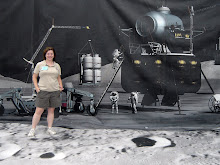
Today I got a call from my mom, who pleaded with me to tell her we weren't putting the little rover to sleep like a sick animal. It never fails to amaze me how much these rovers capture the public imagination. In
reading the news today after she called, the media stories may have been a little out of proportion - we never had a plan to shut one rover down entirely. Anyway, looks like that letter with the funding cuts has been rescinded for now.
Yes, MER was scheduled to take a $4M cut this year and an $8M cut next year, which is about 40% of our current operating budget. When it comes to the rovers, nobody wants them to get more sleep, or go to sleep forever! Least of all the awesome team who operates them every day. But we work within a zero-sum budget, and every year that we ask for more money to keep operating these little dudes means a year when that money can't be spent on new missions. The other currently operating Mars missions,
Mars Reconnaissance Orbiter and
Mars Odyssey also had orders to absorb budget cuts.
Right now, the rover team operates on $20M per year. When we had $40M/yr, we had both rovers planning every weekday, and had abilities like keeping the engineers overtime or on weekends when the planning needed them, or extra staff for troubleshooting, and had all the science team members on board. When we cut back to $20M it was painful, but we accommodated the cut partly by cutting back on operations - like only planning 8 cycles a week and no weekends or overtime, and partly by having some of the science team take cuts to their budgets. Cutting a further 40% means cutting into muscle.
We got the call on Monday and I thought that our PI and project manager had a well-reasoned plan for dealing with this - it wasn't panic and it wasn't chaos. Spirit is hunkered down for the winter, but still requires a full science and engineering staff to send up imaging and monitoring commands. There's lots we can do sitting in one spot, but it wouldn't be tragic to put Spirit into hibernation. We have some good lessons learned from
hunkering down in last year's dust storms and would be confident that Spirit would be kept safe until spring. We'd miss out on some interesting science but could deal. Scientists would also take cuts and that's harder on a personal level - too little money means that we have to go work on other projects and it's not easy to come back if & when things ramp back up.
Fortunately, the cuts that put us into that situation appear to be reversed for now. The rovers will surely die someday of natural causes. But for now they continue to do interesting science, and we can do our best to keep getting the most out of them and our team. We ask for the best but plan for what we are given. I think it is fair to say that the whole MER team wants MSL to succeed - indeed, many of the MER team is on the MSL team as well. So it's not really fair to cast it as an us-vs-them situation either.
What's the difference between cancelling a mission and putting a rover to sleep?
Wrap your brain around NASA-ese and the MER kerfluffle over on IFOV.



